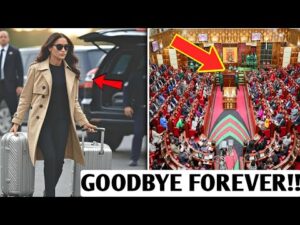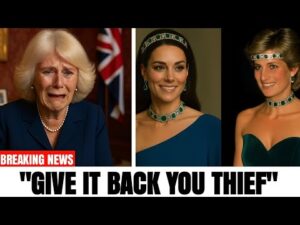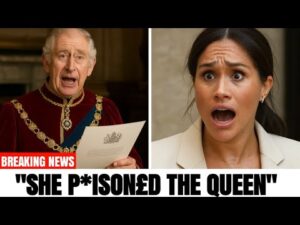Meghan Gose Nuts As Prince Harry ABANDON Her In Montecito With Kids And Gose Permanently Back To UK.

To an outsider, Monteceto was a dream.
The sun-drenched hills, the sprawling estates tucked behind gates. The quiet streets where celebrities and moguls moved almost invisibly through their lives. It was a sanctuary the world could only imagine. When Prince Harry and Meghan Markle arrived in this enclave of luxury, it seemed as if they had finally found a place where freedom and safety could coexist. But behind the manicured gardens and the perfectly staged Instagram shots, reality was far more complex, far more volatile than anyone could see.
Before we continue, please hit the like button, subscribe to the channel, and turn on the notification bell for updates. From the very beginning, there was a disconnect between perception and truth. The world saw a couple who had escaped the relentless scrutiny of the British press, who had fled the suffocating expectations of the royal family. They saw freedom, adventure, and a new chapter that promised happiness unshackled by tradition. Yet for Harry, Monteceto was not just a haven. It was a reminder of everything he had left behind. Every sunlit walk on the beach was tinged with nostalgia for a home he had abandoned. And every smile Megan directed at the cameras was layered with tension that no filter could erase.
Megan embraced Monteceto with a zeal that bordered on obsession. She curated every detail of their life there—the decor of their home, the curated social circle, the interviews she granted, the public appearances she staged. She wanted the world to see not just a duchess in exile, but a queen in her own right, commanding her kingdom of California.
Her days were filled with meetings with producers, brand strategists, and high-profile friends, all designed to cement her status as more than just a royal who had walked away. To Megan, this was validation, and she pursued it relentlessly. Harry, however, found himself increasingly alienated. The life that had been sold to him as liberation felt more like a gilded cage. He watched Megan navigating Monteceto with a kind of energy and ferocity that was exhausting to keep pace with. Every day seemed to demand more of him—more smiles for the cameras, more nods to deals he barely understood, more participation in a life that was not entirely his own.
He loved Megan. He loved their children. And he loved the idea of a life free from the suffocating grip of royal expectations. But he also began to realize that freedom did not mean peace, and escape did not mean happiness. The tension started in small ways. Harry would find himself wandering the property alone, seeking moments of quiet, reflecting on the path that had brought him here. He would think of William, of King Charles, of the familiar rhythms of life in the UK that he had abandoned. In those quiet moments, the laughter of his children felt both joyful and painfully ironic—a reminder that he was physically present but emotionally stretched thin.
Megan noticed a distance in subtle ways, and she interpreted it not as exhaustion or longing but as a lack of commitment to her vision. Every disagreement, every sigh, every hesitant glance became magnified—turned into evidence of a problem that neither could fully articulate. Friends who visited the couple began to notice the subtle cracks. To the casual observer, Harry and Megan still seemed charming, still presented themselves with warmth and wit. But those close enough to see behind the curtain noticed a quieter tension: Harry speaking in guarded tones, Megan’s impatience flaring at small inconveniences. The children sometimes caught in the middle of conversations that should have remained private.
In the early days, these moments were small and easily dismissed. But over time, they accumulated—leaving an invisible mark that no amount of public smile or media messaging could erase. Financial pressures surprisingly also became a source of strain. Megan’s ambitions in California required investment: homes, staff, legal teams, production deals. While Harry had expected some of this, he had not anticipated the constant negotiation of resources, the debates over contracts, and the pressure to maintain appearances for the sake of public perception. Every disagreement over spending or strategy became symbolic of a larger rift between them.
Megan saw Harry’s caution as hesitation, even resistance. Harry saw Megan’s drive as an inability to compromise. Neither fully understood the emotional weight the other carried.
Parenting added another layer of complexity. Harry wanted to preserve as much normalcy as possible—to give their children a grounded childhood despite the fame and scrutiny surrounding them. Megan, however, had a vision aligned with her ambitions—an upbringing carefully curated, with exposure to influential circles and strategic opportunities for branding. While neither approach was inherently wrong, the clash of philosophies created friction. Playdates, schooling, and simple daily routines became arenas of negotiation—each interaction colored by the unspoken tension between freedom and control.
The Monteceto community, while welcoming, was also a mirror of expectations. Neighbors were curious, sometimes intrusive, always aware that Harry and Megan’s presence had transformed the quiet enclave into a hub of media tension. There were moments of isolation where the couple could not walk a short distance without drawing notice; moments where Harry longed for the anonymity that the California sun could not provide. Megan, ever the strategist, embraced the visibility, seeing every appearance as an opportunity to reinforce her brand and her narrative.
The contrast between their desires became starker by the day. Social events—once a source of pleasure—became sources of contention. Invitations to galas, Hollywood parties, and industry mixers were often steeped in expectation. Megan thrived in these spaces, drawing energy from the networking, the recognition, the affirmation of her influence. Harry, who had once been comfortable in such settings, now felt like an actor in someone else’s play. His laughter was sometimes delayed, his engagement measured, his energy waning.
What had been a shared adventure in the beginning was slowly morphing into separate journeys running parallel under the same roof. The media too played its part. Despite moving across the Atlantic, Harry and Megan were never truly free from public scrutiny. Paparazzi still tracked their every step. Social media amplified every misstep, every disagreement, every misinterpreted gesture. To Megan, this attention was a weapon to wield—a stage on which to assert her independence. To Harry, it was a relentless reminder that no distance could insulate him from the pressures of his past.
Every article, every headline, every online comment became another weight pressing against his desire for normalcy. By the time the first year in Monteceto had passed, it was clear that the couple’s vision of a shared utopia was fraying at the edges. The home that had been meant as a sanctuary was now a pressure cooker of ambitions, resentments, and unmet expectations. Harry felt the pull of the UK growing stronger—a voice he had once silenced in pursuit of love now demanding attention. Megan felt the empire she was building threatened by a partner who seemed increasingly reluctant to play his role.
The mirage of Monteceto had shifted from dream to challenge, and neither knew if the structure they had built could withstand the tension any longer. And yet, they both held on. For Harry, it was love for…




